Charles E W Bean, Diaries, AWM38 3DRL 606/38B/1 - Notebook - Part 3
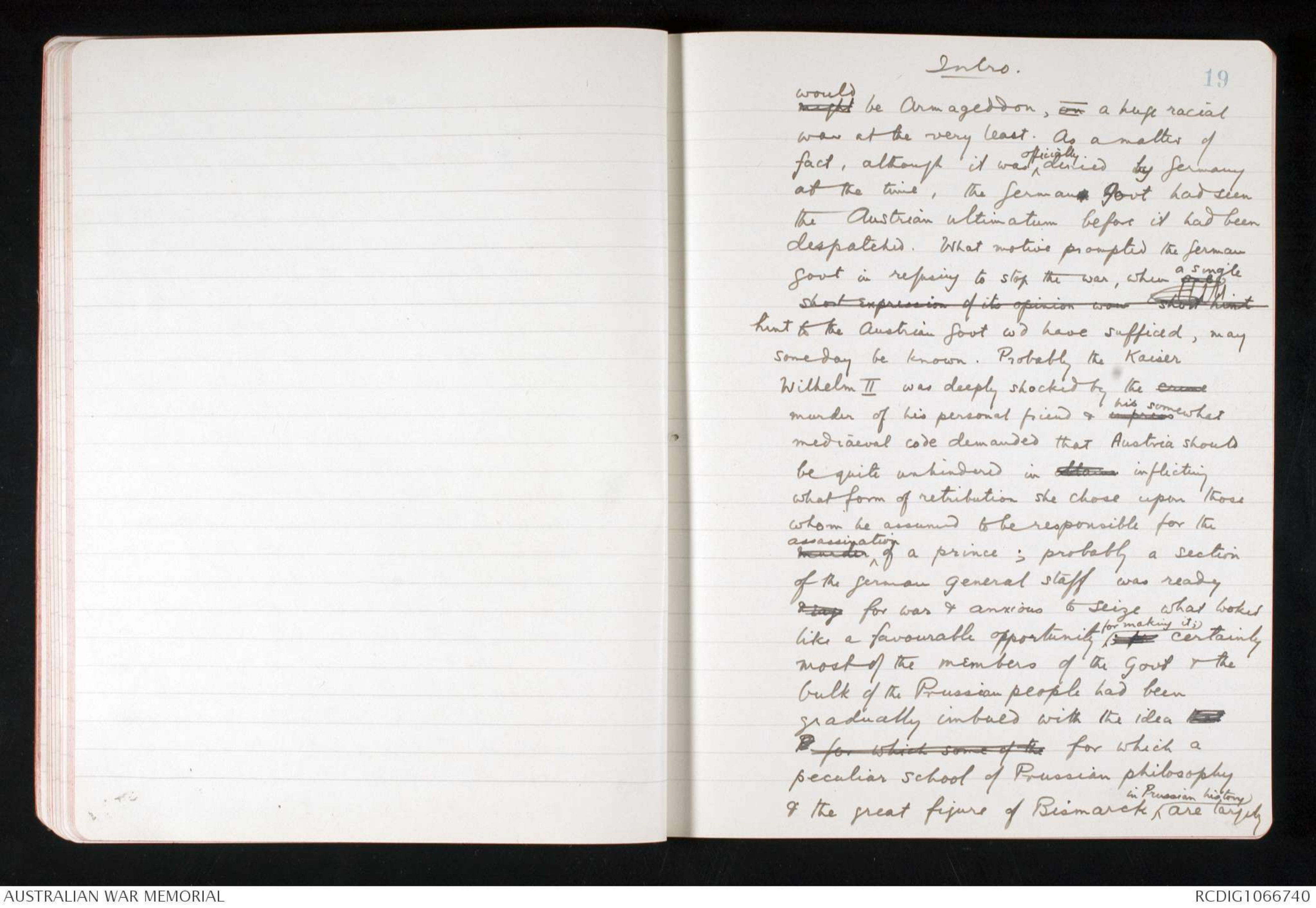
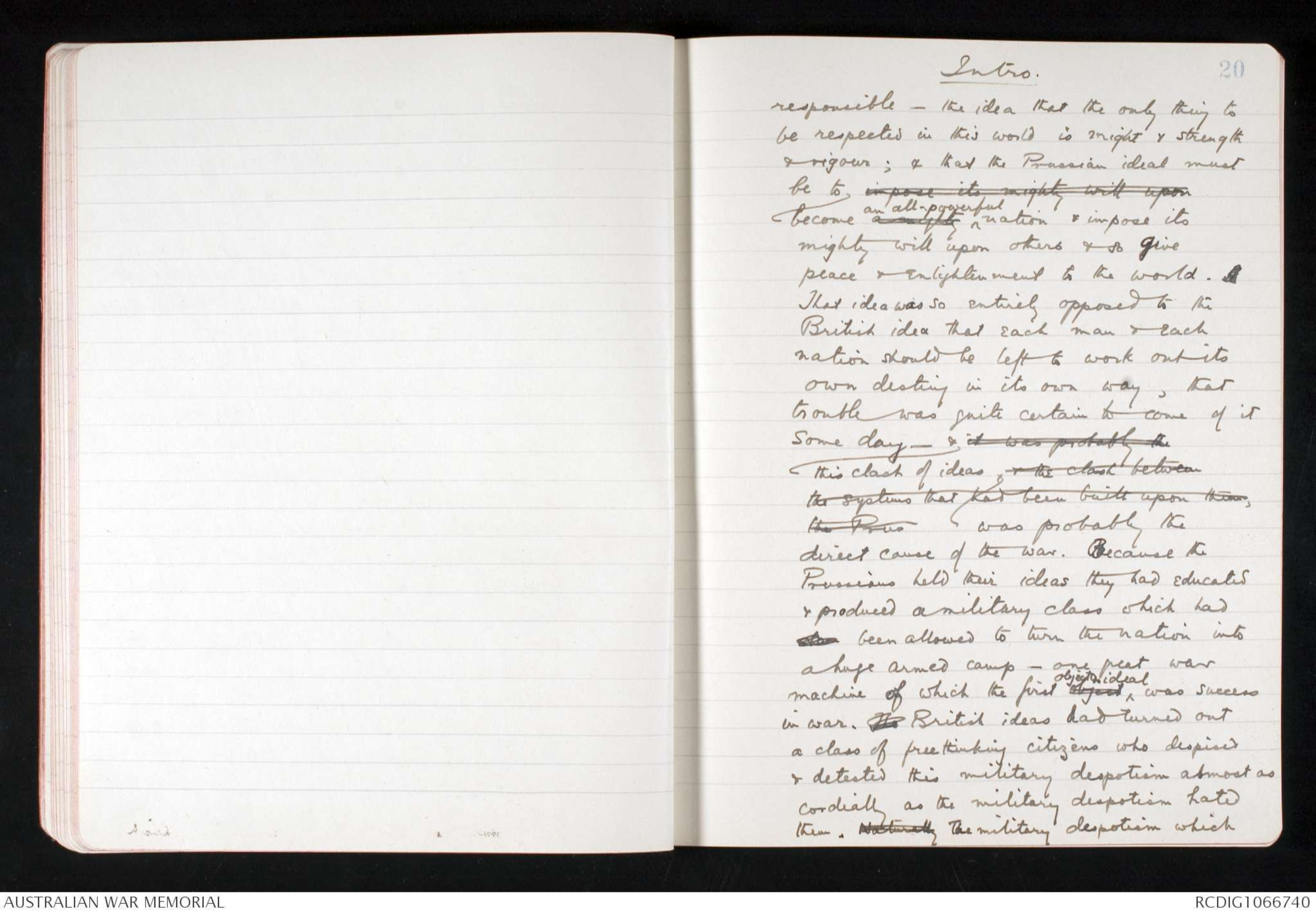
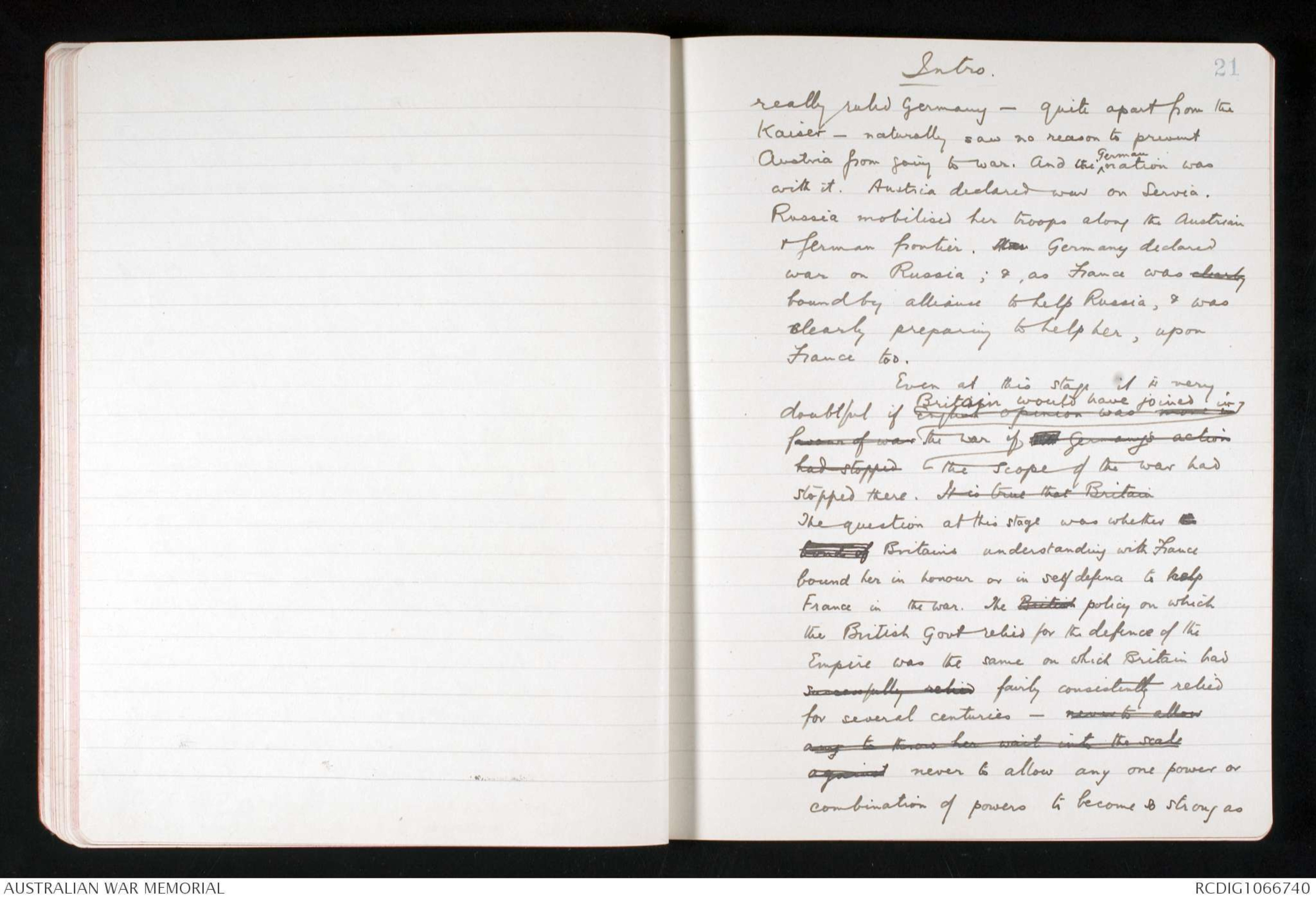
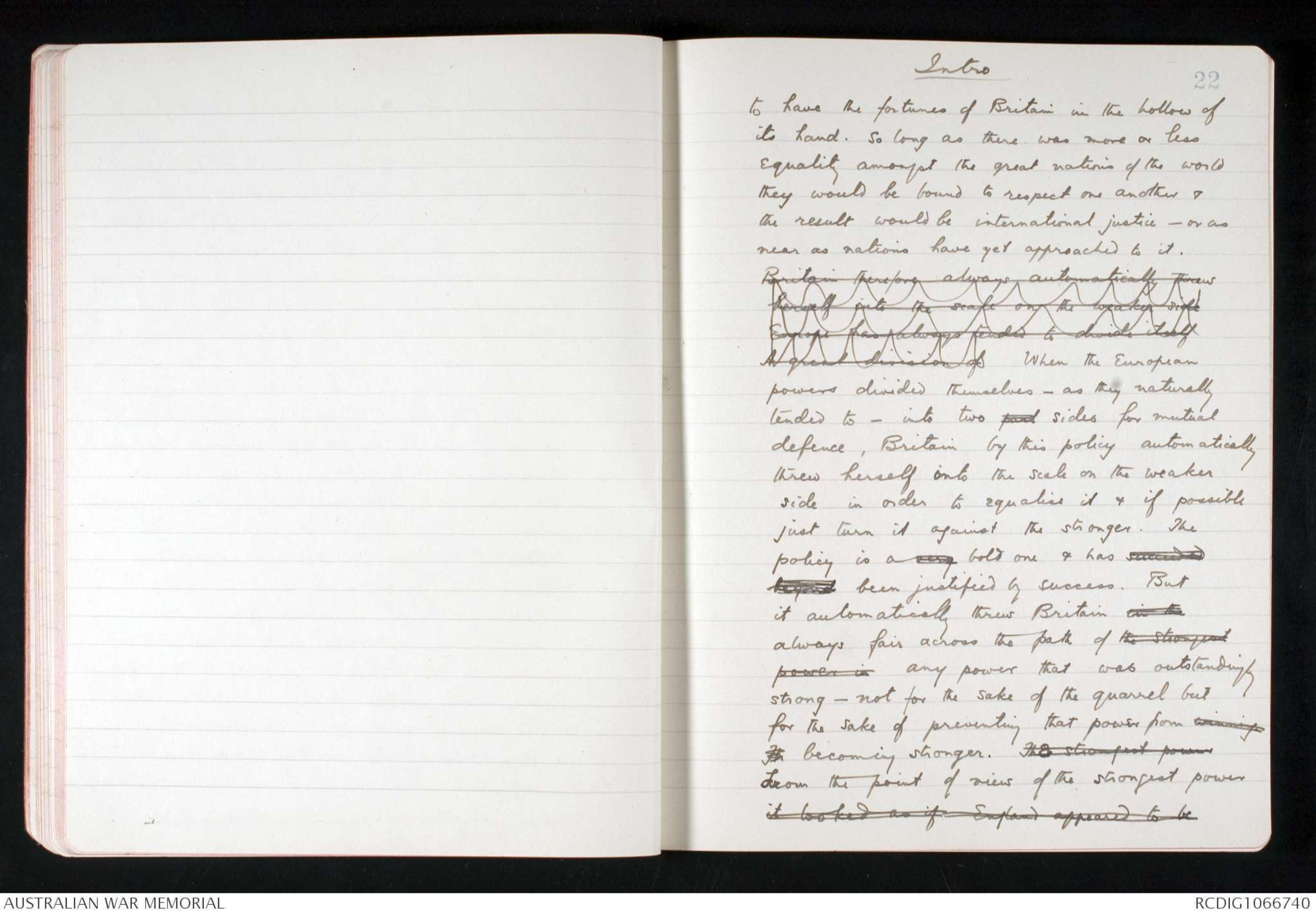
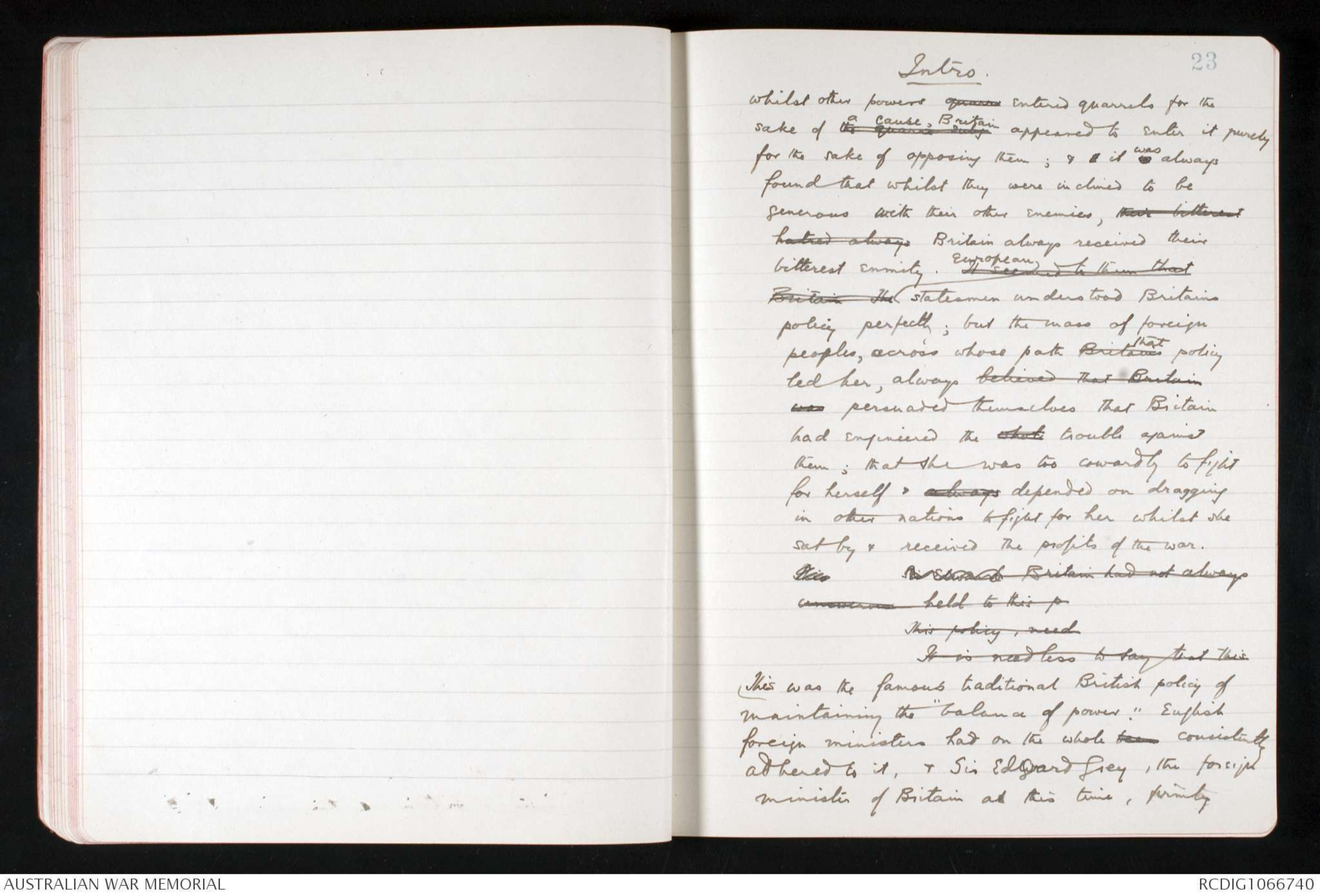
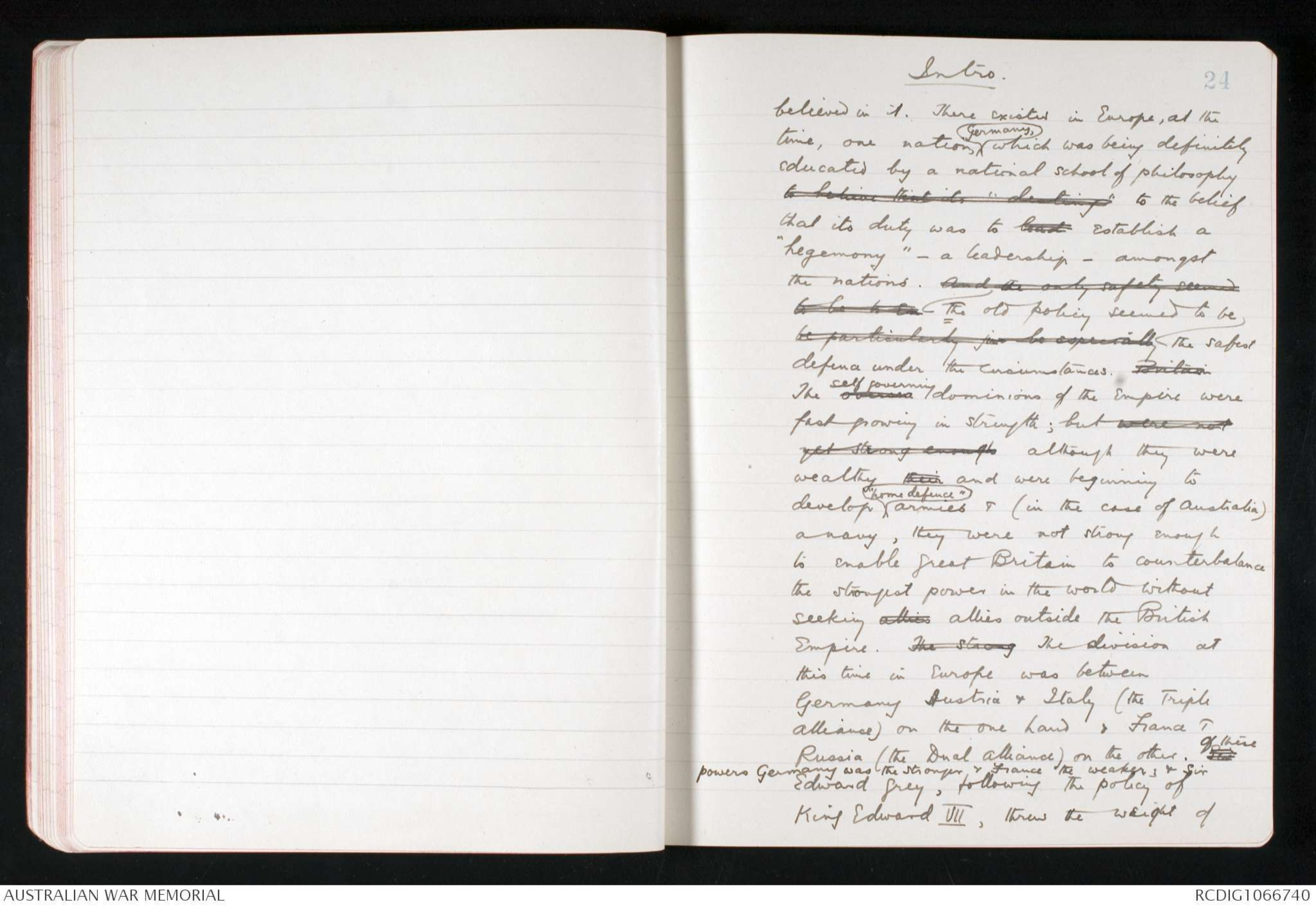
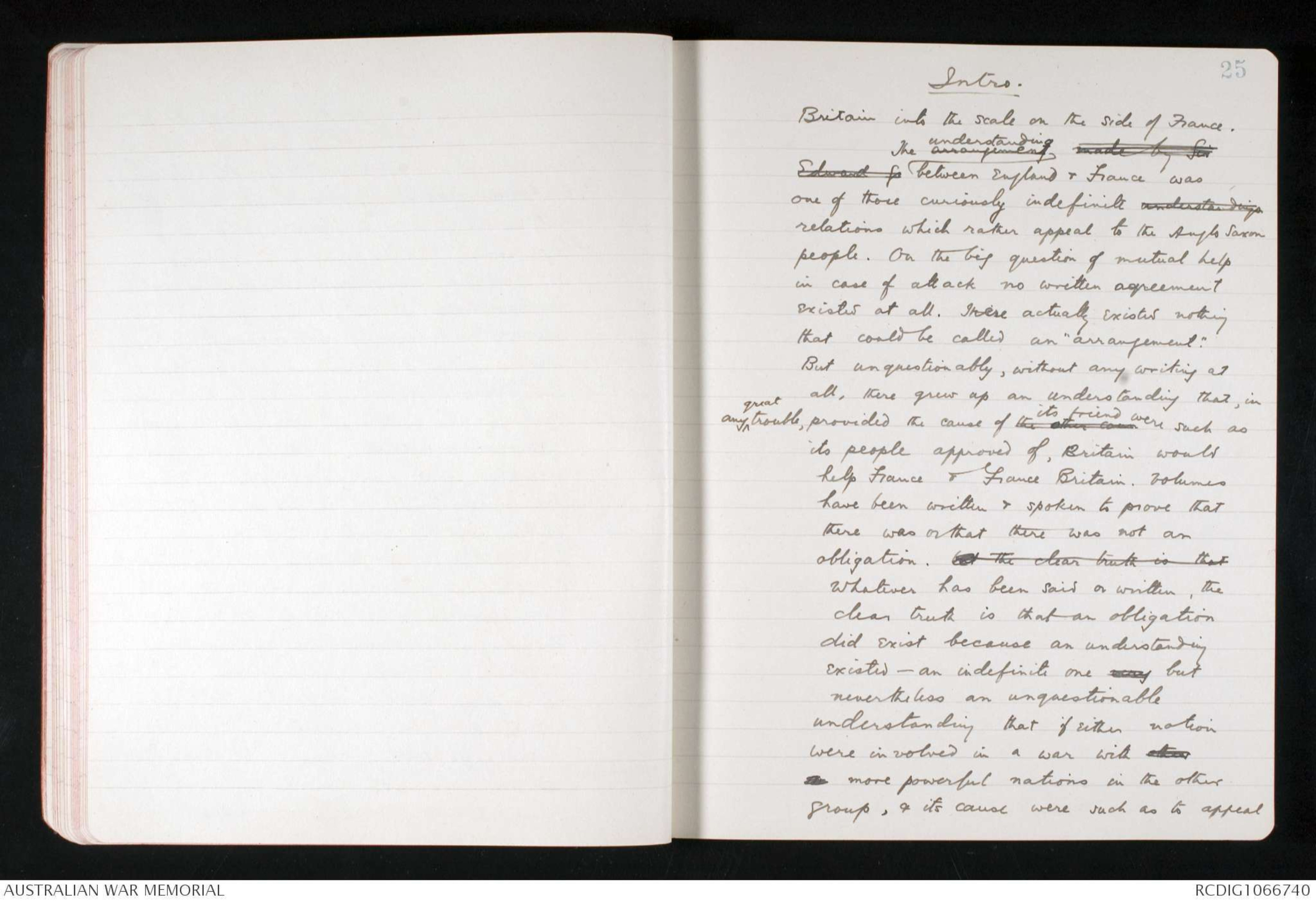
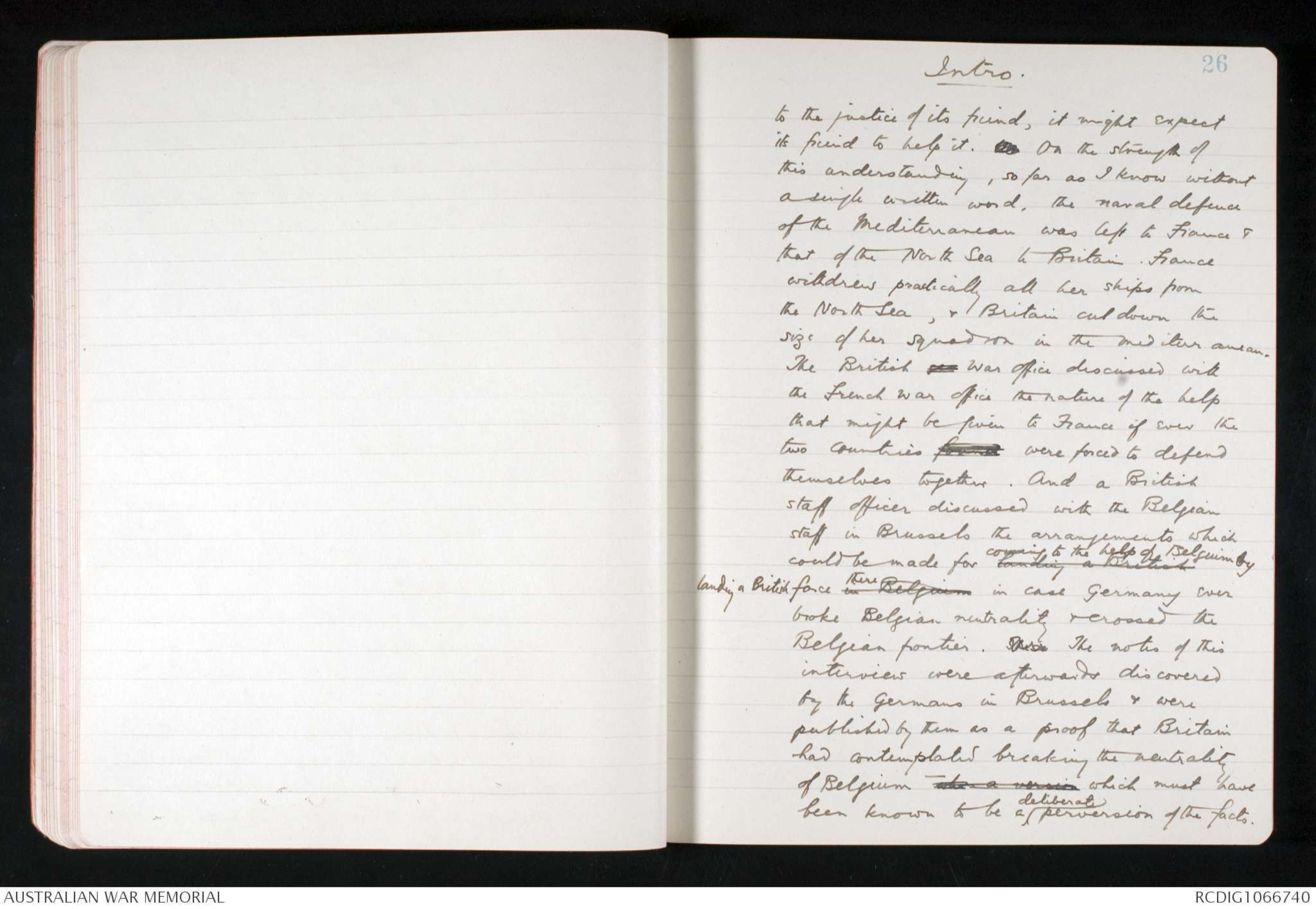
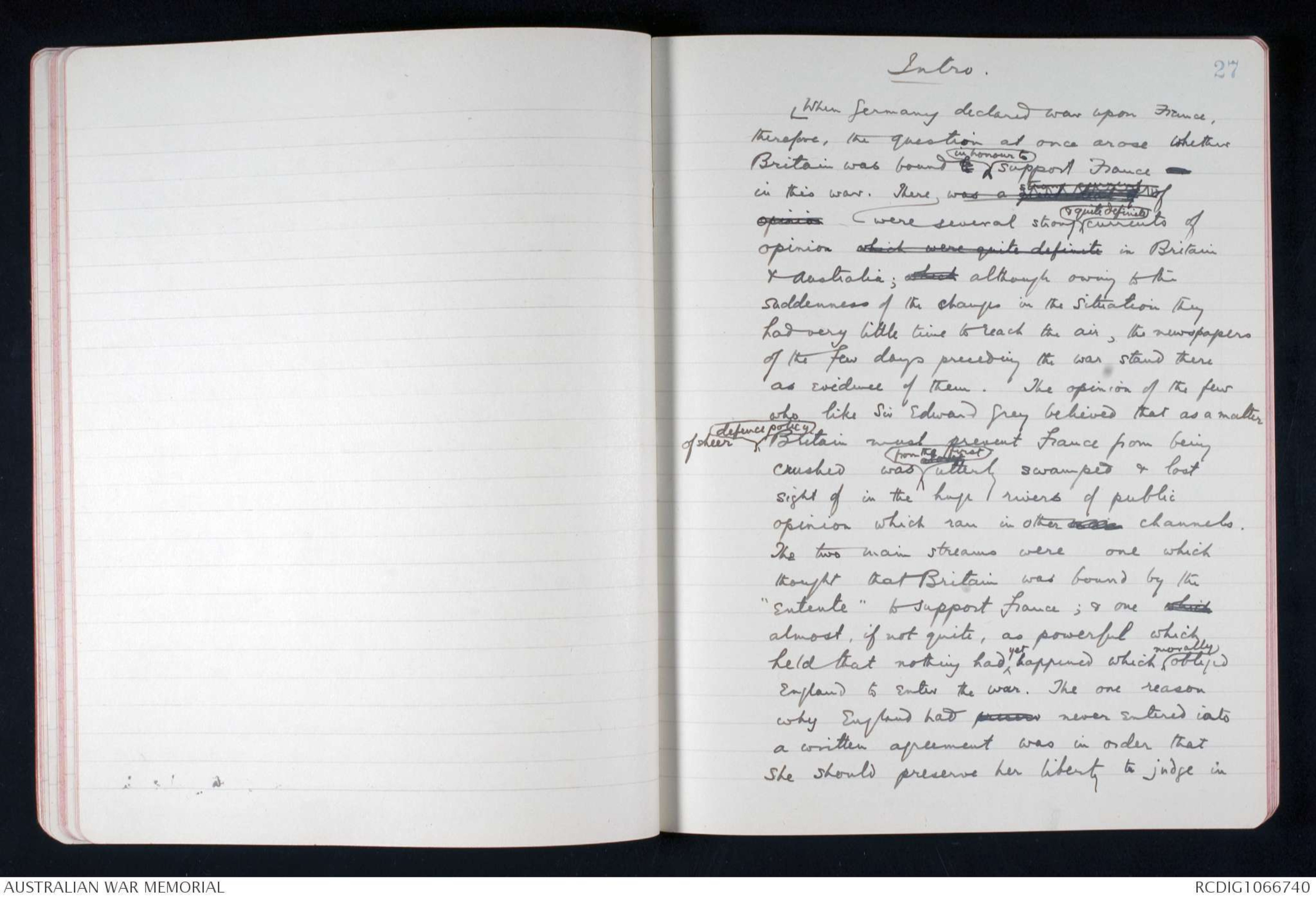
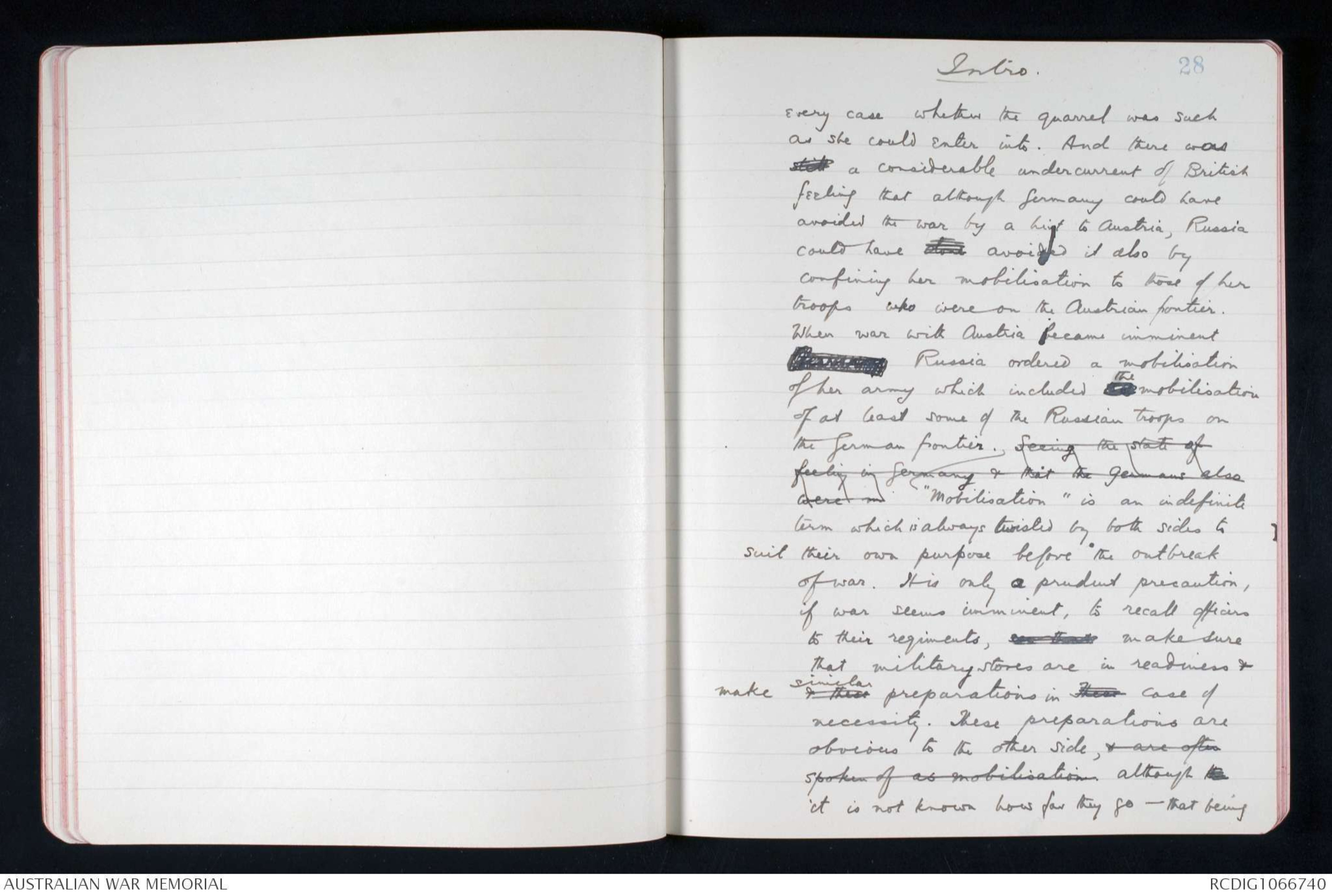
19
Intro
might would be Armageddon, or a huge racial
war at the very least. As a matter of
fact, although it was ^officially denied by Germany
at the time, the Germans Govt had seen
the Austrian ultimatum before it had been
despatched. What motive prompted the German
Govt in refusing to stop the war, when one a single
short expression of its opinion wou short hint
hint to the Austrian Govt wd have sufficed, may
someday be known Probably the Kaiser
Wilhelm ll was deeply shocked by the crime
murder of his personal friend & impress his somewhat
mediaeval code demanded that Austria should
be quite unhindered in obtain inflicting
what form of retribution she chose upon those
whom he assumed to be responsible for the
murder ^assassination of a prince; probably a section
of the German general staff was ready
& eage for war & anxious to seize what looked
like a favourable opportunity ^for making it; ;fr certainly
most of the members of the Govt & the
bulk of the Prussian people had been
gradually imbued with that idea that
x for which some of the for which a
peculiar school of Prussian philosophy
& the great figure of Bismarck ^in Prussian history are largely
20
Intro
responsible - the idea that the only thing to
be respected in this world is might & strength
& rigour; & that the Prussian ideal must
be to impose its mighty will upon
become a mighty ^an all-powerful nation & impose its
mighty will upon others & so give
peace & enlightenment to the world. T
That idea was so entirely opposed to the
British idea that each man & each
nation should be left to work out its
own destiny in its own way, that
trouble was quite certain to come of it
some day - & it was probably the
this clash of ideas & the clash between
the system that had been built upon there,
the Prus was probably the
direct cause of the war. Because the
Prussians held their ideas they had educated
& produced a military class which had
xxx been allowed to turn the nation into
a huge armed camp - one great war
machine of which the first object ^object ideal was success
in war. The British ideas had turned out
a class of free thinking citizens who despised
& detested this military despotism almost as
cordially as the military despotism hated
them. Nationally The military despotism which
21
Intro
really ruled Germany - quite apart from the
Kaiser - naturally saw no reason to prevent
Austria from going to war. And the ^German nation was
with it. Austria declared war on Servia.
Russia mobilised her troops along the Austrian
& German frontier. Then Germany declared
war on Russia; &, as France was clearly
bound by alliance to help Russia, & was
clearly preparing to help her, upon
France too.
Even at this stage it is very
doubtful if English opinion was more in Britain would have joined in favour of war the war if xxx Germany's action
had stopped the scope of the war had
stopped there. It is true that Britain
The question at this stage was whether xx
bond of Britains understanding with France
bound her in honour or in self defence to help
France in the war. The British policy on which
the British Govt relied for the defence of the
Empire was the same on which Britain had
successfully relied fairly consistently relied
for several centuries - never to allow
any to throw her waist into the scale
against never to allow any one power or
combination of powers to become so strong as
22
Intro
to have the fortunes of Britain in the hollow of
its hand. So long as there was more or less
equality amongst the great nations of the world
they would be bound to respect one another &
the result would be international justice - or as
near as nations have yet approached to it.
Britain therefore always automatically threw
herself into the scale on the weaker side
Europe has always tended to divide itself
A great division of When the European
powers divided themselves - as they naturally
tended to - into two part sides for mutual
defence, Britain by this policy automatically
threw herself into the scale on the weaker
side in order to equalise it & if possible
just turn it against the stronger. The
policy is a very bold one & has succeeded
beyond been justified by success. But
it automatically threw Britain in the
always fair across the path of the strongest
power in any power that was outstandingly
strong - not for the sake of the quarrel but
for the sake of preventing that power from winning
Th becoming stronger. The strongest power
From the point of view of the strongest power
it looked as if England appeared to be
23
Intro
whilst other powers quarre entered quarrels for the
sake of the quarre only a cause Britain appeared to enter it purely
for the sake of opposing them; & x it x was always
found that whilst they were inclined to be
generous with their other enemies their bitterest
hatred always Britain always received their
bitterest enmity. It seemed to them that
Britain The European statesmen understood Britains
policy perfectly; but the mass of foreign
peoples across whose path Britain that policy
led her, always believed that Britain
was persuaded themselves that Britain
had engineered the what trouble against
them; that she was to cowardly to fight
for herself & always depended on dragging
in other nations to fight for her whilst she
sat by & received the profits of the war
this Sir Edward Britain had not always
xxxxxxxx held to this p
This policy, need
It is needless to say that this
This was the famous traditional British policy of
maintaining the "balance of power." English
foreign minsters had on the whole been consistently
adhered to it, & Sir Edward Grey, the foreign
minster of Britain at this time, firmly
24
Intro
believed in it. There existed in Europe, at the
time, one nation ^Germany which was being definitely
educated by a national school of philosophy
to believe xxxx its "destiny" to the belief
that its duty was to lead establish a
"hegemony" - a leadership - amongst
the nations. And the only safety seemed
to be x xxx The old policy seemed to be
be particularly jsut be especially the safest
defence under the circumstance. Britain
The overseas self governing dominions of the Empire were
fast growing in strength; but were not
yet strong enough although they were
wealthy their and were beginning to
develop ^"home defence"armies & (in the case of Australia)
a navy, they were not strong enough
to enable Great Britain to counter balance
the strongest power in the world without
seeking allies allies outside the British
Empire. The strong The division at
this time in Europe was between
Germany Austria & Italy (the Triple
Alliance) on the one Land & France &
Russia (the Dual Alliance) on the other. The Of these
powers Germany was the stronger & France the weaker & Sir
Edward Grey, following The policy of
King Edward Vll , threw the weight of
25
Intro.
Britain into scale on the side of France.
The arrangement understanding made by Sir
Edward fo between England & France was
one of those curiously indefinite understandings
relations which rather appeal to the Anglo Saxon
people. On the big question of mutual help
in case of attack no written agreement
existed at all. There actually existed nothing
that could be called an "arrangement."
But unquestionably, without any writing at
all, there grew up an understanding that, in
any ^great trouble, provided the cause of the other com its friend were such
as its people approved of, Britain would
help France & France Britain. Volumes
have been written & spoken to prove that
there was or that there was not an
obligation. but The clear truth is that
Whatever has been said or written, the
clear truth is that an obligation
did exist because an understanding
existed - an indefinite one may but
nevertheless an unquestionable
understanding that if either nation
were involved in a war with other
xx more powerful nations in the other
group, & its cause were such as to appeal
26
Intro.
to the justice of its friend, it might expect
its friend to help it. xx On the strength of
this understanding, so far as I know without
a single written word, the naval defence
of the Mediterranean was left to France &
that of the North Sea to Britain. France
withdrew practically all her ships from
the North Sea, & Britain cut down the
size of her squadron in the Mediterranean.
The British xxx War Office discussed with
the French War Office the nature of the help
that might be given to France if ever the
two countries found were forced to defend
themselves together. And a British
staff officer discussed with the Belgian
staff in Brussels the arrangement which
could be made for landing a British coming to the help of Belgium by
landing a British force in Belgium there in case Germany ever
broke Belgian neutrality & crossed the
Belgian frontier. There The notes of this
interview were afterwards discovered
by the Germans in Brussels & were
published by them as a proof that Britain
had contemplated breaking the neutrality
of Belgium- when a version which must have
been known to be a ^deliberate perversion of the facts.
27
Intro.
When Germany declared war upon France,
therefore, the question at once arose whether
Britain was bound xx ^in honour to support France xx
in this war. There was a xxxxxxxxxxxxx
opinion were several strong ^& quite definite currents of
opinion which were quite definite in Britain
& Australia; which although owing to the
suddenness of the change in the situation they
had very little time to reach the air, the newspapers
of the few days preceding the war stand there
as evidence of them. The opinion of the few
who like Sir Edward Grey believed that as a matter
of sheer ^defence policy Britain must prevent France from being
crushed was^ from the first alone utterly swamped & lost
sight of in the huge rivers of public
opinion which ran in other xxxx channels.
The two main streams were one which
thought that Britain was bound by the
"Entente" to support France; & one which
almost, if not quite, as powerful which
held that nothing had ^yet happened which ^morally obliged
England to enter the war. The one reason
why England had preserv never entered into
written agreement was in order that
she should preserve her liberty to judge in
28
Intro
every case whether the quarrel was such
as she could enter into. And there was
still a considerable undercurrent of British
feeling that although Germany could have
avoided the war by a hint to Austria, Russia
could have done avoided it also by
confining her mobilisation to those of her
troops who were on the Austrian frontier.
When war with Austria became imminent
xxxxxxx Russia ordered a mobilisation
of her army which included xxx the mobilisation
of at least some of the Russian troops on
the German frontier. Seeing the state of
feeling in Germany & that the Germans also
were in "Mobilisation" is an indefinite
term which is always twisted by both sides to
suit their own purpose before the outbreak
of war. It is only a prudent precaution,
if war seems imminent, to recall officers
to their regiments, xxx xxxx make sure
that military stores are in readiness &
make similar & these preparations in these case of
necessity. These preparations are
obvious to the other side, & are often
spoken of as mobilisation although the
it is not known how far they go - that being
 Deb Parkinson
Deb ParkinsonThis transcription item is now locked to you for editing. To release the lock either Save your changes or Cancel.
This lock will be automatically released after 60 minutes of inactivity.